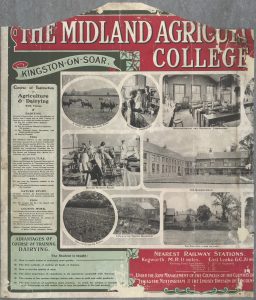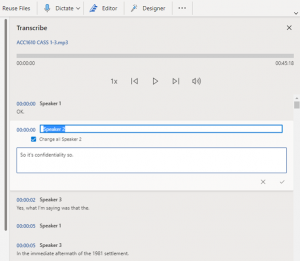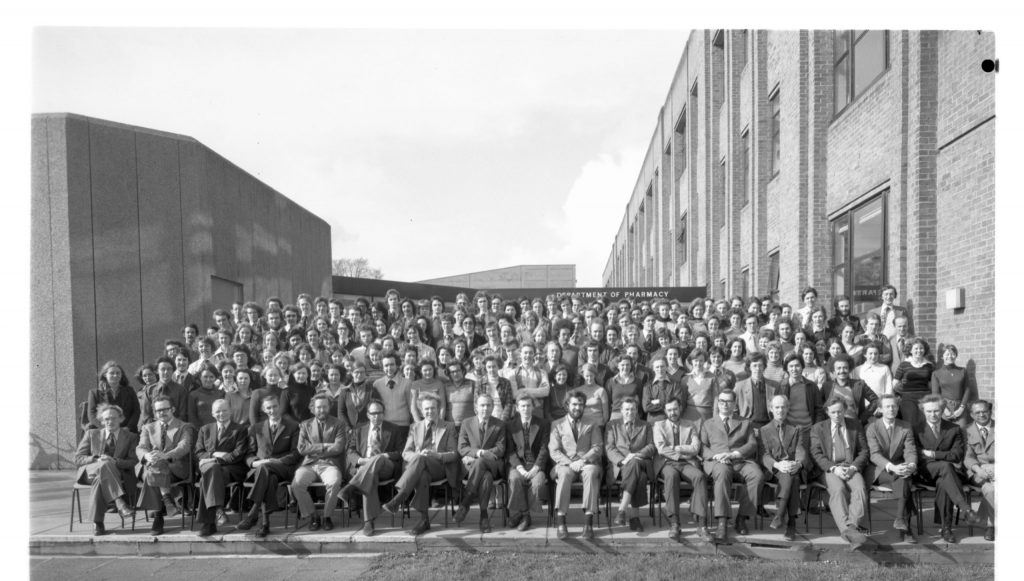July 11, 2022, by Sarah Colborne
Remote volunteering: tackling transcriptions
This is a guest post by Manuscripts and Special Collections volunteer, Emily Williams, who worked with digitised versions of analogue recordings for a remote placement devised especially for providing careers experience when we were unable to host volunteers in our reading room.
Commencing in the summer of 2020, I was given the opportunity to complete remote volunteer work for the Manuscripts and Special Collections Department. With the effects of the COVID-19 pandemic still prevalent, finding voluntary work in a field that interested me was extremely challenging, hence I jumped at this opportunity! Having studied a wide array of classical and medieval literature, as an English and Classics undergraduate, the importance of literary transmission and preservation was something that greatly intrigued me. Archival work seemed a good way to learn more about this area of scholarship.
My main role these past six months, has been to transcribe the tapes of Brian Tolley, of which the university has a large collection; 108 in total. Brian Tolley was commissioned to compose a history of the University of Nottingham, and in 2001 he published a book; ‘The History of the University of Nottingham.’ During Tolley’s process of compiling his history, many interviews, recorded on tape, took place. 8 of Tolley’s tapes were nominated for transcription in 2017, and since then, 99 tapes have been selected for digitisation, as part of the British Library Save Our Sounds Project in 2020. Recently, I have transcribed and summarised two of these tapes. The first, discussing the development of Horticulture within the university, and the second tape discussing the Department of Pharmacy.
Both tapes, which were 45 minutes to 1 hour long, had a Word auto-transcription that could be edited. However, I found it quicker to transcribe the tapes without the (humorously inaccurate!) automatic feature. I enjoyed the challenge of learning about the online digitisation process, especially since transcription is something I’ve not attempted before. I also had to provide a summary for both tapes, stating the key areas of discussion. In many ways, this was the most important part of the task, since the summaries would provide a key reference point for scholars looking to establish the relevance of a tape to their research.

Poster for The Midland Agricultural College at Kingston-on-Soar, Nottinghamshire. Undated, but the college was based at Kingston between 1906 and 1919.
The most interesting discussions in the tapes centred around: the merging of the Agricultural College with the University of Nottingham in 1948; the relationship between Sutton Bonington and the main University Park (tape 1); as well as the relationship the chemistry department had with other scientific (e.g. neurology and the medical school) and also non-scientific university departments (such as the graphics department) (tape 2). As a humanities student, I was unsure about how stimulating I would find discussions of these (and to me very foreign!) departments, however it was intriguing to learn how different teams and departments collaborated within the university (a theme of both tapes), and I really enjoyed finding out about how the university has changed and developed over the years, into the university I am now familiar with. As a student studying much older eras of time and literature, this project really opened my eyes to how transcription remains important for even recent periods of history, alongside those periods where papyrus and ink were the key resources for literary preservation.
To find out more about our collections at Manuscripts and Special Collections, visit our website, follow us on Twitter or Instagram, or read our newsletter Discover. To book an appointment in the Reading Room, please email us mss-library@nottingham.ac.uk.
No comments yet, fill out a comment to be the first



Leave a Reply